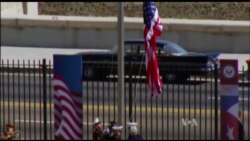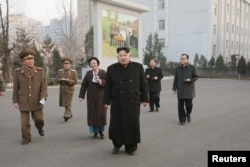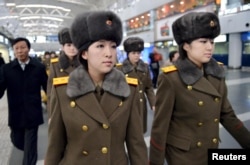Even though U.S. President Barack Obama reached historic diplomatic breakthroughs with other longtime adversaries of the United States, it is unlikely he will realize any progress in limiting North Korea’s nuclear program during the remaining year of his presidency.
The Obama administration’s persistent diplomatic outreach paved the way for normalizing relations with communist Cuba and a deal to limit Iran’s nuclear program.
But on North Korea the U.S. has not shown any urgency to restart negotiations to end Pyongyang's nuclear program, relying instead on sanctions and containment strategies.
Now with U.S. lawmakers focused on recent terrorist attacks and the growing threat from Islamic militants in the Middle East, analysts say, there is little political will in Washington to try to deal with North Korea.
“Given the renewed question of how to deal with terrorism, that just bumps North Korea back down the ladder, even though this issue is not being dealt with and in the long term obviously is a huge problem for national security from a U.S. perspective,” said Professor John Delury, a North Korea analyst at Yonsei University in Seoul.
Collapse ‘inevitable’
North Korea’s belligerent behavior, which includes reneging on a nuclear deal in 2008 and provocations, including a 2013 nuclear test that even drew protests and sanctions from its key ally China, has made any outreach difficult.
The change in North Korean leadership that occurred during Obama’s time in office was also a factor.
Kim Jong Il, who exercised absolute control over the government and the country for decades suffered a debilitating stroke in 2008 and died in 2011.
At the time it was unclear whether his heir, the young and inexperienced Kim Jong Un, could gain control over rival factions in the Kim family and the government.
Professor Delury said there was a prevailing opinion at that time that the tightly controlled communist system that had left millions impoverished could not long survive.
“It was natural that you had the analytical community saying this system is not going to make it through a second transition of power. It should have gone away a long time ago and now it’s finally going to go away. And so that influenced, I think, the White House’s thinking about North Korea from the get-go,” Delury said
Kim Jong Un, however, has endured.
He has continued his father polices of harsh authoritarian control while also prioritizing the development of nuclear weapons.
Sanctions
And he remains defiant and belligerent in the face of international sanctions, travel restrictions, and the United Nations’ efforts to prosecute North Korea for widespread human rights violations.
North Korea’s poverty rate remains high. The U.N. reported this year that 84 percent of households have "borderline or poor food consumption."
Still, the country’s economy is improving thanks to agriculture and other incentive-based, market-oriented reforms, as well as increased trade and assistance from China.
“I believe that Kim Jong Un is unsatisfied with the isolated status. However, the regime is experiencing less pain than we think from the outside,” said Cheong Seong-chang, a North Korea analyst with the Sejong Institute in Seoul.
Failure to engage
While there is an international consensus that North Korea’s growing nuclear arsenal threatens regional stability and world peace, there is division among key players on how to persuade Pyongyang to abandon its nuclear ambitions.
The Obama administration has repeatedly called upon the international community to increase pressure on North Korea to restart talks to dismantle its nuclear weapons in exchange for ending sanctions and increasing aid and assistance.
Washington and Seoul both hold that Pyongyang must first halt its nuclear program before formal talks can occur.
China supports talks without conditions and has been reluctant to further press North Korea out of concern that might increase instability at its border.
However recent failed attempts to engage North Korea by China and South Korea illustrate how difficult it is to deal with the unpredictable and confrontational state.
North Korea band
On December 12, North Korea’s all-female Moranbong Band suddenly canceled its performance in Beijing.
No clear explanation was given but South Korea’s National intelligence agency Tuesday said a disagreement over some provocative songs boasting about North Korea’s nuclear program led to the cancellation.
And two days of inter-Korean talks failed to yield any agreements on modest cooperative projects like instituting regular reunions for families that were separated by the division of the Korean peninsula and restarting cross-border tourism.
South Korean military commanders on Monday said they are preparing for increased provocations, suggesting that North Korea may soon conduct a long-range ballistic missile test in defiance of U.N. restrictions.
With diplomacy stalled, the North Korean problem will likely remain one that President Obama leaves to his successor.
Youmi Kim in Seoul contributed to this report.










